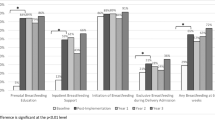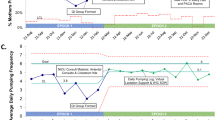Abstract
Objective:
Evaluate the impact of a non-neonatal intensive care unit (NICU)-specific peer counseling (PC) program on the cessation of human milk receipt at and post-NICU discharge.
Study Design:
A multivariable logistic regression model used data from 400 mother–infant dyads from a level IV NICU to compare cessation of human milk receipt at NICU discharge by PC program status. Kaplan–Meier distributions and a multivariable Cox proportional hazards model assessed the relationship between participants/non-participants and cessation of human milk post-NICU discharge.
Results:
No statistically significant differences between groups in cessation of human milk either by or post-discharge were observed. Identified variables associated with the outcome(s) of interest included maternal and infant age, length of stay, presence of a breastfeeding duration goal and frequency of NICU lactation consultant contact.
Conclusion:
Exposure to a non NICU-specific PC program was not associated with human milk receipt either by or post-NICU discharge.
This is a preview of subscription content, access via your institution
Access options
Subscribe to this journal
Receive 12 print issues and online access
$259.00 per year
only $21.58 per issue
Buy this article
- Purchase on Springer Link
- Instant access to full article PDF
Prices may be subject to local taxes which are calculated during checkout

Similar content being viewed by others
References
Boyd CA, Quiqley MA, Brocklehurst P . Donor breast milk versus infant formula for preterm infants: a systematic review and meta-analysis. Arch Dis Child Fetal Neonatal Ed 2007; 92: F169–F175.
Maayan-Metzger A, Avivi S, Schushan-Eisen I, Kuint J . Human milk versus formula feeding among preterm infants: short-term outcomes. Am J Perinatol 2012; 29 (2): 121–126.
Vohr BR, Poindexter BB, Dusick AM, McKinley LT, Higgins RD, Langer JC et al. Persistent beneficial effects of breast milk ingested in the neonatal intensive care unit on outcomes of extremely low birth weight infants at 18 months of age. Pediatrics 2007; 120 (4): e953–e959.
Vohr BR, Poindexter BB, Dusick AM, McKinley LT, Wright LL, Langer JC et al. Beneficial effects of breast milk in the neonatal intensive care unit on the developmental outcome of extremely low birth weight infants at 18 months of age. Pediatrics 2006; 118 (1): e115–e123.
Ip S, Chung M, Raman G, Chew P, Magula N, DeVine D et al. Breastfeeding and maternal and infant health outcomes in developed countries. Evid Rep Technol Assess 2007; 153: 1–186.
US Department of Health and Human Services. Healthy People 2020: Maternal, Infant, And Child Health: Objectives. Available at http://www.healthypeople.gov/2020/topics-objectives/topic/maternal-infant-and-child-health/objectives?topicId=26 (accessed on 6 November 2014).
Centers for Disease Control and Prevention. Breastfeeding Report Card–United States, 2014. Available at http://www.cdc.gov/breastfeeding/pdf/2014breastfeedingreportcard.pdf (accessed on 17 July 2015).
Rossman B, Engstrom JL, Meier PP . Healthcare providers’ perceptions of breastfeeding peer counselors in the neonatal intensive care unit. Res Nurs Health 2012; 35 (5): 460–474.
Callen J, Pinelli J, Atkinson S, Saigal S . Qualitative analysis of barriers to breastfeeding in very-low-birthweight infants in the hospital and postdischarge. Adv Neonatal Care 2005; 5 (2): 93–103.
Anderson AK, Damio G, Young S, Chapman DJ, Perez-Escamilla R . A randomized trial assessing the efficacy of peer counseling on exclusive breastfeeding in a predominantly Latina low-income community. Arch Pediatr Adolesc Med 2005; 159: 836–841.
Merewood A, Philipp BL . Peer counselors for breastfeeding mothers in the hospital setting: trials, training, tributes, and tribulations. J Hum Lact 2003; 19 (1): 72–76.
Merewood A, Chamberlain LB, Cook JT, Philipp BL, Malone K, Bauchner H . The effect of peer counselors on breastfeeding rates in the neonatal intensive care unit. Arch Pediatr Adolesc Med 2006; 160: 681–685.
Chapman DJ, Morel K, Anderson AK, Damio G, Perez-Escamilla R . Breastfeeding peer counseling: from efficacy through scale-up. J Hum Lact 2010; 26 (3): 314–326.
Connecticut WIC Program Breastfeeding Peer Counseling Implementation Plan – Update, 2013. Available at http://www.ct.gov/dph/lib/dph/wic/carols_stuff/CT_BF_Peer_Counseling_Program_Update_to_Implementation_Plan_2014_final_8-9-13.pdf (accessed on 30 July 2015).
Kehler HL, Chaput KH, Tough SC . Risk factors for cessation of breastfeeding prior to six months postpartum among a community sample of women in Calgary, Alberta. Can J Public Health 2009; 100 (5): 376–380.
Chin AC, Myers L, Magnus JH . Race, education, and breastfeeding initation in Louisiana, 2000-2004. J Hum Lact 2008; 24: 175–185.
Brand E, Kothari C, Stark MA . Factors related to breastfeeding discontinuation between hospital discharge and 2 weeks postpartum. J Perinat Educ 2011; 20 (1): 36–44.
Thulier D, Mercer J . Variables associated with breastfeeding duration. J Obstet Gynecol Neonatal Nurs 2009; 38 (3): 259–268.
Killersreiter B, Grimmer I, Buhrer C, Dudenhausen JW, Obladen M . Early cessation of breast milk feeding in very low birthweight infants. Early Hum Dev 2001; 60 (3): 193–205.
Kirchner L, Jeitler V, Waldhor T, Pollak A, Wald M . Long hospitalization is the most important risk factor for early weaning from breast milk in premature babies. Acta Paediatr 2009; 98: 981–984.
Zhou W, Ryan AS . Lower breastfeeding rates persist among the Special Supplemental Nutrition Program for Women, Infants, and Children participants, 1978-2003. Pediatrics 2006; 117 (4): 1136–1146.
Chapman DJ, Damio G, Young S, Perez-Escamilla R . Effectiveness of breastfeeding peer counseling in a low-income, predominantly Latina population: a randomized controlled trial. Arch Pediatr Adolesc Med 2004; 158 (9): 897–902.
Gross SM, Resnik AK, Cross-Barnet C, Nanda JP, Augustyn M, Paige DM . The differential impact of WIC peer counseling programs on breastfeeding initiation across the state of Maryland. J Hum Lact 2009; 25 (4): 435–443.
Coulibaly R, Seguin L, Zunzunegui MV, Gauvin L . Links between maternal breast-feeding duration and Quebec infants’ health: a population-based study. Are the effects different for poor children? Matern Child Health J 2006; 10 (6): 537–543.
Rea MD, Morrow AL . Protecting, promoting, and supporting breastfeeding among women in the labor force. Adv Exp Med Biol 2004; 554: 121–132.
Meier PP, Engstrom JL, Rossman B . Breastfeeding peer counselors as direct lactation care providers in the neonatal intensive care unit. J Hum Lact 2013; 29 (3): 313–322.
Gonzalez KA, Meinzen-Derr J, Burke BL, Hibler AJ, Kavinsky B, Hess S et al. Evaluation of a lactation support service in a children’s hospital neonatal intensive care unit. J Hum Lact 2003; 19 (3): 286–292.
Maia C, Brandao R, Roncalli A, Maranhao H . Length of stay in a neonatal intensive care unit and its association with low rates of exclusive breastfeeding in very low birth weight infants. J Matern Fetal Neonatal Med 2011; 24 (6): 774–777.
Acknowledgements
We are grateful for the assistance provided by Kelsey Smith for data management and by Meghan DeMatta and Julia Woods for data entry.
Author information
Authors and Affiliations
Corresponding author
Ethics declarations
Competing interests
The authors declare no conflict of interest.
Additional information
Supplementary Information accompanies the paper on the Journal of Perinatology website
Supplementary information
Rights and permissions
About this article
Cite this article
Cornell, E., Lerer, T., Hagadorn, J. et al. A well-baby peer counseling program is not associated with human milk receipt in the NICU. J Perinatol 36, 758–762 (2016). https://doi.org/10.1038/jp.2016.75
Received:
Revised:
Accepted:
Published:
Issue Date:
DOI: https://doi.org/10.1038/jp.2016.75



